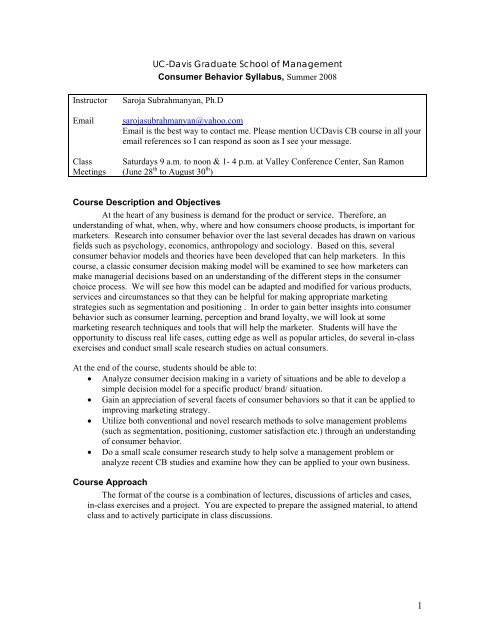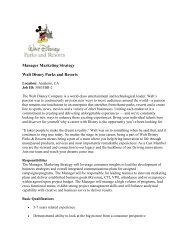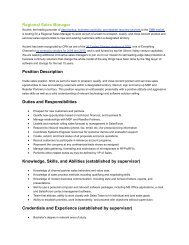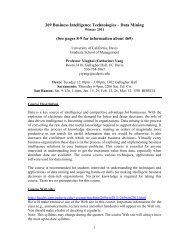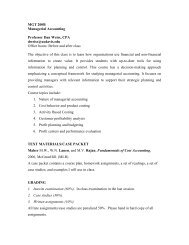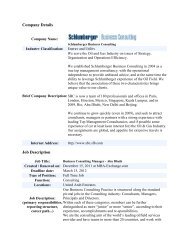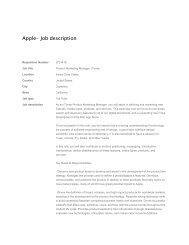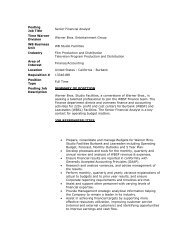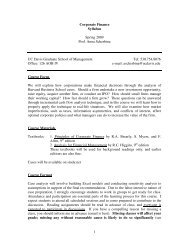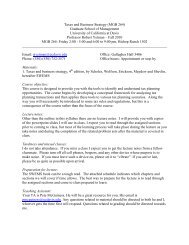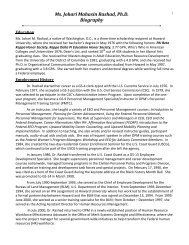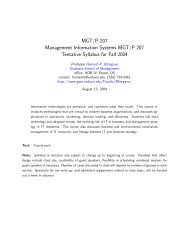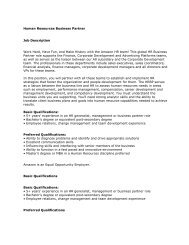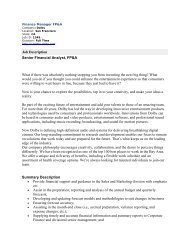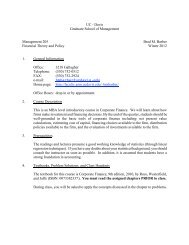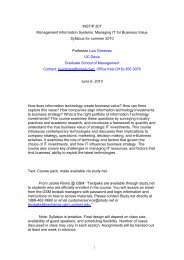MGP 293 Consumer Behavior - Students - UC Davis
MGP 293 Consumer Behavior - Students - UC Davis
MGP 293 Consumer Behavior - Students - UC Davis
You also want an ePaper? Increase the reach of your titles
YUMPU automatically turns print PDFs into web optimized ePapers that Google loves.
<strong>UC</strong>-<strong>Davis</strong> Graduate School of Management<br />
<strong>Consumer</strong> <strong>Behavior</strong> Syllabus, Summer 2008<br />
Instructor<br />
Email<br />
Class<br />
Meetings<br />
Saroja Subrahmanyan, Ph.D<br />
sarojasubrahmanyan@yahoo.com<br />
Email is the best way to contact me. Please mention <strong>UC</strong><strong>Davis</strong> CB course in all your<br />
email references so I can respond as soon as I see your message.<br />
Saturdays 9 a.m. to noon & 1- 4 p.m. at Valley Conference Center, San Ramon<br />
(June 28 th to August 30 th )<br />
Course Description and Objectives<br />
At the heart of any business is demand for the product or service. Therefore, an<br />
understanding of what, when, why, where and how consumers choose products, is important for<br />
marketers. Research into consumer behavior over the last several decades has drawn on various<br />
fields such as psychology, economics, anthropology and sociology. Based on this, several<br />
consumer behavior models and theories have been developed that can help marketers. In this<br />
course, a classic consumer decision making model will be examined to see how marketers can<br />
make managerial decisions based on an understanding of the different steps in the consumer<br />
choice process. We will see how this model can be adapted and modified for various products,<br />
services and circumstances so that they can be helpful for making appropriate marketing<br />
strategies such as segmentation and positioning . In order to gain better insights into consumer<br />
behavior such as consumer learning, perception and brand loyalty, we will look at some<br />
marketing research techniques and tools that will help the marketer. <strong>Students</strong> will have the<br />
opportunity to discuss real life cases, cutting edge as well as popular articles, do several in-class<br />
exercises and conduct small scale research studies on actual consumers.<br />
At the end of the course, students should be able to:<br />
• Analyze consumer decision making in a variety of situations and be able to develop a<br />
simple decision model for a specific product/ brand/ situation.<br />
• Gain an appreciation of several facets of consumer behaviors so that it can be applied to<br />
improving marketing strategy.<br />
• Utilize both conventional and novel research methods to solve management problems<br />
(such as segmentation, positioning, customer satisfaction etc.) through an understanding<br />
of consumer behavior.<br />
• Do a small scale consumer research study to help solve a management problem or<br />
analyze recent CB studies and examine how they can be applied to your own business.<br />
Course Approach<br />
The format of the course is a combination of lectures, discussions of articles and cases,<br />
in-class exercises and a project. You are expected to prepare the assigned material, to attend<br />
class and to actively participate in class discussions.<br />
1
Course Materials<br />
Reading Packet: A list of cases and articles will be provided. Most cases are from<br />
Harvard Business Publishing. Articles are from leading consumer research journals as<br />
well as some popular business magazines.<br />
Textbook: There is no specific textbook assigned. There are plenty of textbooks in the<br />
market. You can use any of them to supplement the textpak. One recent book that you<br />
might consider is: <strong>Consumer</strong> <strong>Behavior</strong>: How Humans Think, Feel and Act in the<br />
Marketplace, by Banwari Mittal et al, Open Mentis Publishing, 2008.<br />
Some fun books to read on consumer behavior:<br />
Positioning: The Battle for your Mind by Al Ries and Jack Trout; McGraw Hill<br />
How the Cadillac Got its Fins: Jack Mingo, Harper.<br />
Crossing the Chasm, Geoffrey Moore, Harper Business.<br />
How Customers Think, Gerald Zaltman, HBS Press.<br />
Why we Buy, The Science of Shopping, Paco Underhill, Simon Schuster.<br />
Evaluation<br />
1. Group Case Analysis : Report & Presentation 15%<br />
2. Individual write-up of Case : Report 15%<br />
3. Individual write-up of Articles (2*5) 10%<br />
4. Mini-Project**: (Individual or Group) 10%<br />
5. Class Participation, Discussion and Critique of Cases/ Articles/ Projects,<br />
25%<br />
Group In-Class Exercises<br />
6. Term Project (can be done in group or individually) 25%<br />
** You can opt to do two additional article reviews instead of a mini-project<br />
Case Discussions<br />
Cases are carefully chosen to highlight different aspects of consumer behavior and their<br />
implication for marketing strategy. I will provide a set of questions for each case that you can use<br />
as a signpost. However, you need not restrict yourself to these questions or issues. You can raise<br />
additional issues that you consider relevant and important. As you are probably aware, all cases<br />
are about some events that happened in the past (obviously, since it is already published). One<br />
temptation in analyzing the case and deciding on a managerial course of action is to do what the<br />
firm subsequently did in real life. This, however, may not necessarily be the correct approach.<br />
The firm’s actual decision may or may not be the best approach. Also, other factors subsequent<br />
to the case would have impacted the actual decision taken by management. The value of a case is<br />
in looking at the case data alone and any other info that would have been common knowledge at<br />
the time of the case and then deciding on a course of action. Although cases are historical, they<br />
are very valuable in giving us an opportunity to see how basic consumer behavior principles can<br />
be applied to marketing strategy even if specific circumstances vary.<br />
Case presentation and Report:<br />
Five cases have been designated for in-depth discussion and report writing by groups and for<br />
individual submissions. These are:<br />
1. TiVo in 2002<br />
2. L’Oreal Class to Mass with Plenitude<br />
3. Inside Intel Inside<br />
4. Priceline.com: Naming your Own Price<br />
5. Pokemon you Gotta Catch ‘em All<br />
2
Each of these cases will be assigned to a group on first day of class. Each group will<br />
present and write a detailed analysis of the assigned case.<br />
Each individual will also submit One detailed case analysis of any of the above<br />
5 cases (apart from the one they were assigned as a group). Since I would like<br />
these to be spread out over the term, I will have sign-up sheets for these on first day of class.<br />
This written reports whether for individual or group assignments can be about 3-5 pages<br />
(typed, double spaced and font size 12). The actual number of pages are not important- what I<br />
will be looking for is whether you have identified the major CB issues in the case, suggested a<br />
suitable course of action for management and give compelling reasons why. The rest of the class<br />
should also come prepared to discuss the case. Your class participation marks depend on how<br />
well you are able to critique the presenting group and offer your own solutions and suggestions.<br />
Grades for both the presenting group and the rest of the class also depend on<br />
whether you are able to generate a lively and pertinent discussion.<br />
Article Discussion & Report<br />
Articles are chosen from both leading marketing journals as well as a few from popular<br />
journals and business magazines related to the topic under discussion for that session. These are<br />
meant to provide a basis for discussing the topic of the day.<br />
Each individual will do two “article reviews” over the term. Each review may be based<br />
on one article or on a combination of related articles. The first review is due on first day of<br />
class (June 28 th ). Choose one or more related articles (or even a consumer related movie instead<br />
of an article) to do this review. See tentative course outline for list of articles related to topics we<br />
will discuss that day.<br />
The written article review should be brief, about 2-3 pages. It should highlight the<br />
main points, critically review consumer behavior issues and examine how the ideas can be<br />
applied to your business or any business you are interested in. In addition, although a formal<br />
presentation is not required, those submitting the report should lead the class discussion on the<br />
article. I expect others in the class to join in the discussion. For the second review, I will pass<br />
along sign-up sheets to spread them out over the rest of the term.<br />
Mini Projects (MP): The purpose of this activity is to apply concepts or research techniques<br />
discussed in class to obtain consumer behavior insights in a quick and focused manner. Unlike<br />
the term project where I expect you to do a more detailed project, this will be a specific and short<br />
duration activity. This is an opportunity to use new or novel methods, explore hunches or do a<br />
quick informal survey. You may use this mini project as a prelude to your term project so there is<br />
some synergy of effort.<br />
You may submit and present your MP in any of the eight sessions, i.e. except the first and last<br />
sessions. Output is in the form of a written report (2-3 pages) and a brief presentation.<br />
Presentation need not be formal i.e. no need for power point type presentation unless you want to.<br />
The idea is to share your CB insights with the class.<br />
MPs can be done in groups or individually. Ideally it would help to have the MPs related to the<br />
topic under discussion that session or the preceding session. Please let me know in advance (the<br />
previous class or a few days before) when you plan to submit the report & present your findings<br />
3
so that I will know how much time to allocate for other activities. A list of suggested topics will<br />
be in your textpak. If you want to do a MP on June 28 th , please contact me before course starts so<br />
I can help you and also allocate time for your presentation.<br />
Term Project<br />
The purpose of the project is to help you apply concepts learnt to a specific marketing<br />
situation of your choice. You may do this in groups or individually. You may do primary or<br />
secondary research. If you have not already done a course on marketing research, I can give you<br />
a crash course outside class hours. The purpose here is not to evaluate your research per se, but<br />
to provide an opportunity to solve a managerial problem through a better understanding of<br />
consumer behavior by using research as a tool. I expect a short, focused and original<br />
research study where the emphasis is on gaining insights into consumer behavior. If<br />
you plan to extend research done for another project, please cite the earlier work and<br />
show what exactly the new contribution is.<br />
Here are the steps required for the project.<br />
• Identify a management problem/ consumer behavior issue you are interested in.<br />
• Do a brief background research of this problem or issue and why/how you think a better<br />
understanding of consumer behavior will help you solve the management issue. This can<br />
be descriptive based on your current understanding of the situation or from company<br />
literature or research based on published sources.<br />
• Identify one or two research questions that will help you solve the management problem.<br />
• Decide on the best way of doing primary research. You choose any research technique<br />
such as: in-depth interviews, focus group, content analysis, observation, metaphor<br />
elicitation, surveys, experiments or a combination of them.<br />
• Analyze the results and come with a managerial recommendation<br />
<strong>Students</strong> have done very good projects even when the course was done in a one-month<br />
compressed format. Since you have two months, if you start early enough, you can do a fairly indepth<br />
project. Some examples of topics you might consider are given below.<br />
− Defining and eliciting customer satisfaction for a product you are marketing<br />
− Developing a consumer behavior model<br />
− Developing a positioning map<br />
− Spending a day in the life of your customer<br />
−<br />
−<br />
Segmenting your market in a new way based on an understanding of CB<br />
Examine if there is consumer interest in a product/ service (several students have used<br />
this opportunity to check out interest for a new business they were considering).<br />
You may choose any of the above or come with your own. If short and focused is not your<br />
cup of tea, you can do a project which lists ten consumer behavior principles/ insights<br />
you learnt in this course and how you can apply them to your business.<br />
I need a commitment from the group/ individual by July 19 th in the form of a project<br />
proposal. This can be a brief and less than a page. I need to know your topic, research question<br />
you will be studying and the method you will use. This is not for grading purposes but to get you<br />
started on the project and also to help and guide you better. The earlier you decide the more time<br />
you have to actually do your project.<br />
4
Project Report and Presentation: The project report and presentation are due on the<br />
second session of last week, i.e. August 30 th . The project report can be about 5-7 pages (typed,<br />
double-spaced 12 size font). What I am looking for is consumer behavior insights you<br />
obtained through this project and how it was helpful to your business. Make sure,<br />
you include an executive summary at the beginning of the report.<br />
Absences<br />
Please note that missing a whole day on Saturday is equivalent to missing two classes.<br />
This will involve a loss of 10 points (roughly one grade level). If you know in advance you will<br />
miss classes due to travel or other reasons, please consider other courses. If a true medical or<br />
other such emergency arises, I will assign make-ups.<br />
Late Submissions/ Incompletes<br />
All late submissions will involve loss of points. This is fair to all those who are on time.<br />
Also, please submit reports that neat & professional (typed wherever possible, stapled etc.).<br />
Email submissions will be accepted only if I give you special permission. I have had some<br />
haphazard and irregular submissions in the past. Note that any assignment including make-ups<br />
submitted after the last day of class will not be graded. Part of the learning experience in an<br />
MBA program is adhering to a discipline that takes deadlines, professional repots etc. in account.<br />
Also, I am not a full-time faculty member here. My contract ends when the course is over. So,<br />
Incompletes may not be possible unless GSM makes some special arrangement with me for this.<br />
About Me: I got my PhD in marketing from New York University and have been teaching at<br />
universities within the U.S. and abroad for the last seventeen years. I have taught various<br />
marketing courses such as: Marketing Management, Marketing Research, <strong>Consumer</strong> <strong>Behavior</strong>,<br />
New Product Development, Pricing Strategies and Business & Society. In addition to teaching, I<br />
have been a marketing research consultant for non-profit and government agencies abroad and<br />
have also published several papers and business cases in refereed journals and books including an<br />
award winning paper in the Journal of Retailing. In the area of consumer behavior, I am<br />
interested in and have published or presented papers on consumer perceptions of cause-related<br />
marketing, genetically modified foods, gift-giving behavior and consumer learning in an<br />
unfamiliar environment. Currently, I am a marketing research and management consultant as<br />
well as a marketing educator.<br />
--xx--<br />
5


